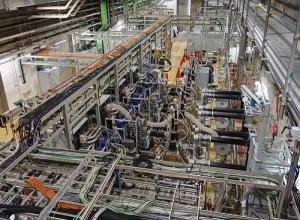At IFMIF, the International Fusion Materials Irradiation Facility, the focus is on preparing for the construction of a fusion-relevant materials test facility through the engineering validation of the principal technological elements.
The assembly and commissioning of the 1:1 prototype accelerator, LIPAc, is progressing well. After producing its first proton (hydrogen) beam
in 2014 at the Broader Approach site in Rokkasho, Japan, LIPAc is ready to enter a new phase. Proton and deuteron beams of will be accelerated to 5 MeV in 2018, with beam operation beginning in February.
In the future material test facility, whose location has not yet been decided, materials will be subjected to high-power impact of fusion neutrons to test their resistance.
One accelerator of deuterons (deuterium ions) at 40 MeV with a current of 125 mA in continuous wave mode will impact a flowing liquid lithium target. The interaction of the accelerated deuterons with the liquid lithium in the loop will generate neutrons similar to those produced in deuterium-tritium fusion reactions. These neutrons will in turn irradiate reduced-scale samples of material to be tested, and other experiments in specific modules.
IFMIF engineering validation and engineering design activities are co-coordinated by the European Implementing Agency of the Broader Approach Agreement (F4E) and its Japanese Implementing Agency (QST).
See the full story on the European Domestic Agency website.


